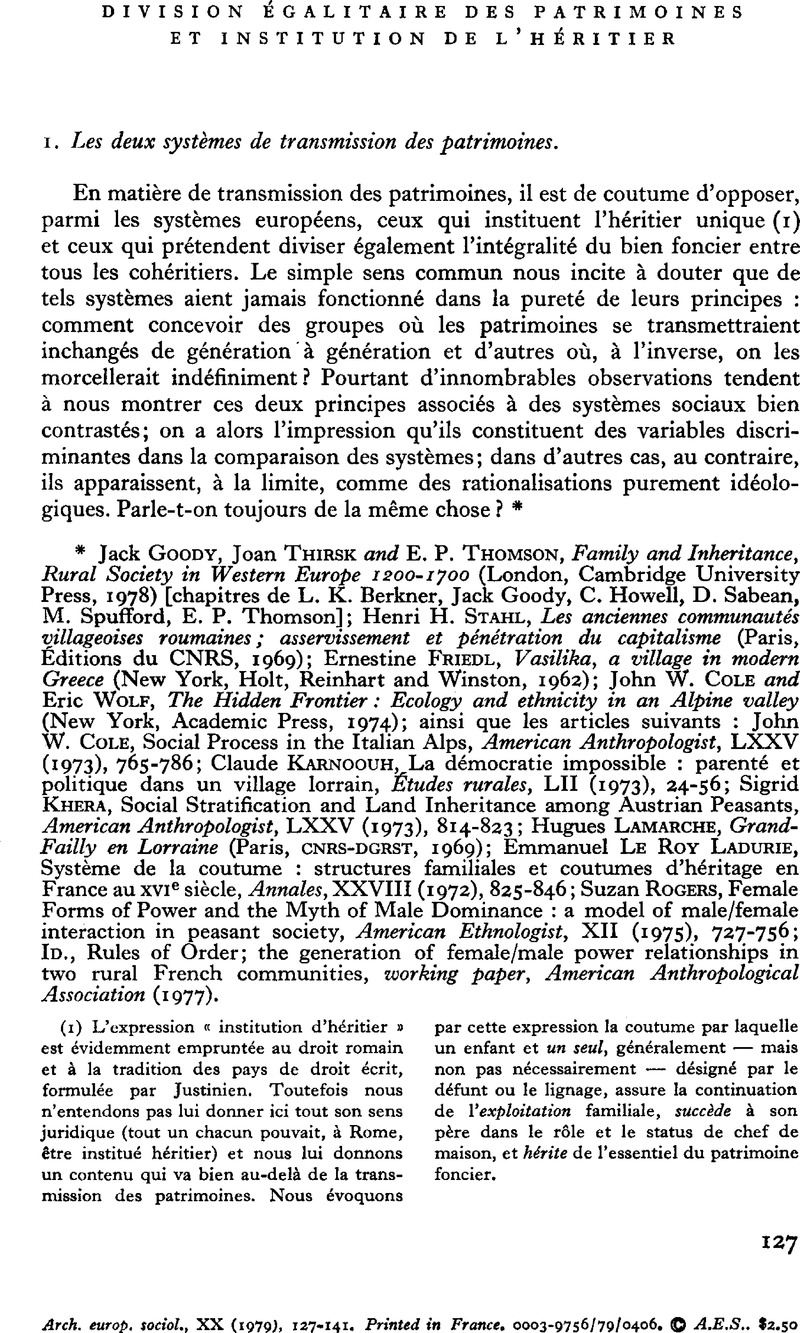Published online by Cambridge University Press: 28 July 2009

* Goody, Jack, Thirsk, Joanand Thomson, E. P., Family and Inheritance, Rural Society in Western Europe 1200–1700 (London, Cambridge University Press, 1978)Google Scholar [chapitres de L. K. Berkner, Jack Goody, C. Howell, D. Sabean, M. Spufford, E. P. Thomson]; Stahl, Henri H., Les anciennes communautés villageoises roumaines; asservissement et pénétration du capitalisme (Paris, Éditions du CNRS, 1969)Google Scholar;Friedl, Ernestine, Vasilika, a village in modern Greece (New York, Holt, Reinhart and Winston, 1962)Google Scholar;Cole, John W. and Wolf, Eric, The Hidden Frontier: Ecology and ethnicity in an Alpine valley (New York, Academic Press, 1974)Google Scholar; ainsi que les articles suivants: Cole, John W., Social Process in the Italian Alps, American Anthropologist, LXXV (1973). 765–786CrossRefGoogle Scholar;Karnoouh, Claude, La démocratic impossible: parenté et politique dans un village lorrain, Études rurales, LII (1973), 24–56CrossRefGoogle Scholar;Khera, Sigrid, Social Stratification and Land Inheritance among Austrian Peasants, American Anthropologist, LXXV (1973), 814–823CrossRefGoogle Scholar;Lamarche, Hugues, Grand Failly en Lorraine (Paris, CNRS-DGRST, 1969)Google Scholar;Ladurie, Emmanuel Le Roy, Systéme de la coutume: structures familiales et coutumes d'héritage en France au xvie siècle, Annales, XXVIII (1972), 825–846CrossRefGoogle Scholar;Rogers, Suzan, Female Forms of Power and the Myth of Male Dominance: a model of male/female interaction in peasant society, American Ethnologist, XII (1975), 727–756CrossRefGoogle Scholar; Id., Rules of Order; the generation of female/male power relationships in two rural French communities, working paper, American Anthropological Association (1977).
(1) L'expression «institution d'héritier» est évidemment empruntée au droit romain et à la tradition des pays de droit écrit, formulée par Justinien. Toutefois nous n'entendons pas lui donner ici tout son sens juridique (tout un chacun pouvait, à Rome, être institué héritier) et nous lui donnons un contenu qui va bien au-delà de la transmission des patrimoines. Nous évoquons par cette expression la coutume par laquelle un enfant et un seul, généralement — mais non pas nécessairement — désigné par le défunt ou le lignage, assure la continuation de l'exploitation familiale, sucéde à son pére dans le rôle et le status de chef de maison, et hérite de l'essentiel du patrimoine foncier.
(2) L'ouvrage Yver, de Jean, Essai de géographie coutumière (Paris 1966)Google Scholar, est souvent cité; l'article d'Emmanuel Le Roy Ladurie, loc. cit., lui est presque totalement consacré.
(3) Augustins, Georges, Reproduction sociale et changement social: I'exemple des Baronnies, Revue française de sociologie, XVIII (1977) 465–484CrossRefGoogle Scholar.